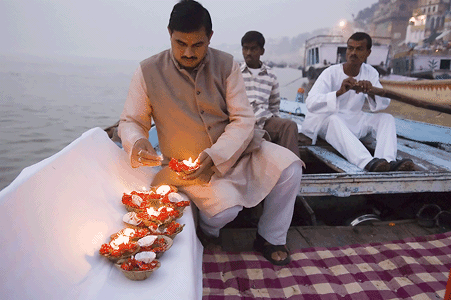Diwali, a Festival of Lights
November 4, 2013
The Hindu festival of Diwali (from a Sanskrit word meaning row of lights) began yesterday. This five-day festival of lights is a national holiday in India and is celebrated in Hindu communities worldwide. It signifies the turning of the human spirit from darkness to light. Families decorate their homes with small oil lanterns (diyas) and flowers. Firework displays are part of the festivities. People also wear new clothing and exchange gifts during the holiday.

A man in India lighting Diwali lamps that are decorated with flowers. During Diwali, the lights symbolize the triumph of good over evil and light over darkness. (© Bob Krist, Corbis).
Diwali celebrates many things. It is a festival for the goddess of wealth, Lakshmi, wife to Vishnu. Diwali is especially significant to merchants, who light small lamps in their homes and shops, hoping the goddess will find them and bring them prosperity. Some Hindus leave their doors and windows open so that the goddess can enter their homes. The holiday also commemorates the return of Rama to the city of his birth—the holy city of Ayodhya—after 14 years in exile. Rama is the hero of the ancient Sanskrit poem the Ramayana. In West Bengal, Diwali is associated with Kali, the goddess of destruction. In Nepal, the holiday marks the victory of Lord Krishna over a demon king.
Sikhs and Jains also celebrate Diwali. For Sikhs, Diwali marks the release of their spiritual leader Guru Hargobind from prison in 1619. Sikhs celebrate Diwali in much the same way as Hindus. Jains celebrate Vira-nirvana, a one-day festival, during Diwali. Vira-nirvana marks the passing of Mahavira, who organized the Jain religion, into nirvana. Sikhs observe this day by lighting lamps and fasting.
Additional World Book articles:


